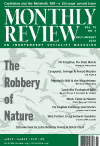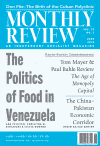2018

This special issue is dedicated to developing the ecological critique embodied in Marx’s theory of “metabolic rift.” Each article uses the metabolic rift perspective to uncover core contradictions of capitalism, as well as possible paths toward a new system—one that will meet human needs while protecting the earth and future generations. | more…

Capitalism and the Metabolic Rift
Marx’s notion of “the robbery of the soil” is intrinsically connected to the rift in the metabolism between human beings and the earth. To get at the complexities of his metabolic rift theory, it is useful to look separately at the issues of the robbery and the rift, seen as separate moments in a single development. | more…

Ecological Disasters and the Lessons of History
When scientists describe the increase of Dust Bowl-like conditions under climate change, they signal a particular kind of violent ecological and social change. But equally violent are the social forces, historical developments, policies, and practices that produce such massive socioecological crises in the first place. | more…

Environmental Crisis and Metabolic Rift in Nineteenth-Century London
The accumulation of human excrement in nineteenth-century cities, particularly London, precipitated a historic environmental crisis—an aspect of the metabolic rift mostly overlooked in ecosocialist analysis. The solution that was finally adopted only shifted the problem out of sight, setting the stage for even greater crises in our time. | more…

Metabolic rift theory can deepen our understanding of the human microbiota—organisms living on and inside of humans—and the ways that capitalism has disrupted these microbial ecosystems, with serious consequences for our health. | more…

A Metabolic Analysis of Nutrient Loading
Increasing rates of nitrogen and phosphorus application have caused severe damage to aquatic systems, as rivers, streams, lakes, bays, and ocean systems have been inundated with nutrient runoff. Only by addressing the metabolic rupture in the soil nutrient cycle and the contradictions of capital can we begin to mend these land–sea rifts. | more…

In recent years ecological critiques of capitalism have deepened and multiplied, resulting in new debates over the conception, scope, and purpose of Marx’s value theory and its relation to the natural world. | more…

If the British people do not take the pains to secure the natural conditions of the permanent fertility of their land, if they allow these conditions as hitherto to be squandered, their fields will at no distant day cease to yield their returns of corn and meat. | more…

I have had abundant opportunity of estimating the impediments which stand in the way of scientific doctrines passing into the domain of practical Agriculture. The reason of which is, especially, that no connexion was formed between Practice and Science. | more…

With the eruption in March of the scandal around Cambridge Analytica and Facebook, articles raising the alarm on “surveillance capitalism” are suddenly everywhere. The term, which was coined in MR in August of 2014, was developed to highlight the links between digital spying systems and contemporary capitalism as a whole. Academic interpretations of the concept effectively divorced surveillance capitalism from class analysis, and from the overall political-economic structure of capitalism—as if surveillance could be abstracted from monopoly-finance capital as a whole. | more…

Few countries and political processes have been subject to such scrutiny, yet so generally misunderstood, as Venezuela and the Bolivarian Revolution. This is particularly true today, as the international media paints an image of absolute devastation in the country, wrought by failed policies and government mismanagement. One way to comprehend the complexities of what is happening in Venezuela today—missed entirely by the dominant, mainstream narrative—is by homing in on the dynamics around Venezuela’s most highly consumed staple foods. | more…

During the 1960s, Cuban medicine experienced changes as tumultuous as the civil rights and antiwar protests in the United States. While activists, workers, and students in western Europe and the United States confronted existing institutions of capitalism and imperialism, Cuba faced the even greater challenge of building a new society. | more…

Beyond the Rule of Capital?
Three hundred years after what became known in the nineteenth century as the Great Game—a struggle for regional hegemony between the British and Russian Empires—Southwest Asia remains an imperial staging ground. The U.S. invasion of Afghanistan in September 2001 signaled Washington’s desire to cement its hegemonic position, but seventeen years later it is mired in an unwinnable war, even as the U.S. economy—and that of much of the Western world—endures the “endless crisis” of contemporary capitalism. | more…












